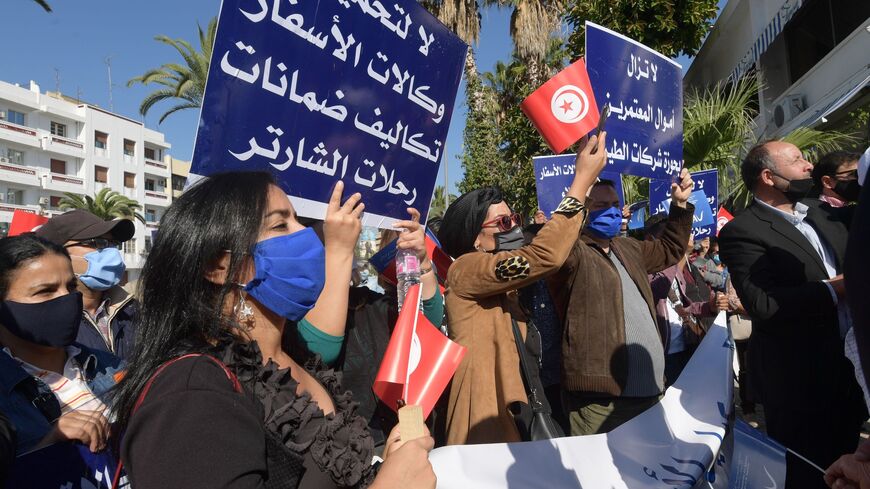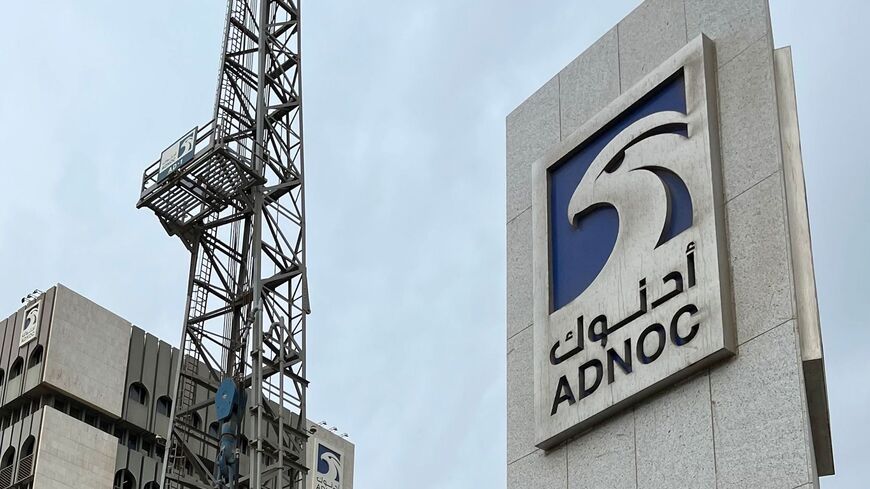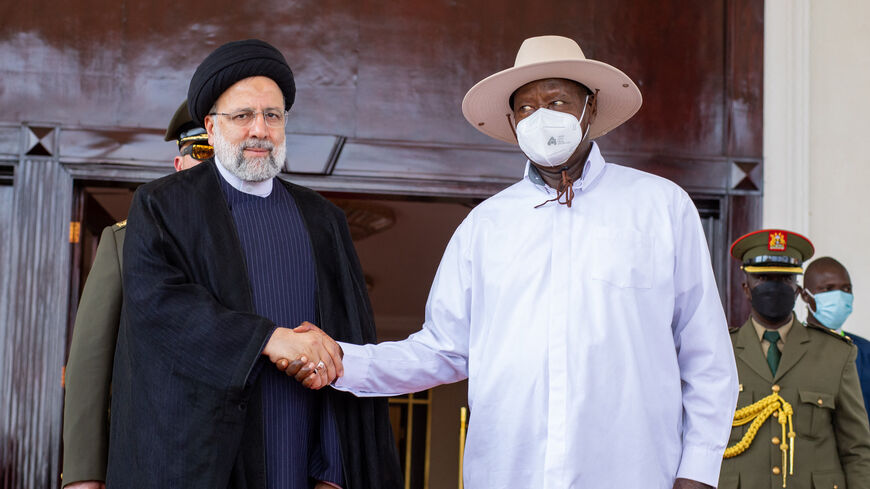Tunisia gains economic breathing room with boost from Saudi Arabia, but budget problems linger
Al-Monitor Pro Members
Stephen Quillen
Tunis-based reporter covering politics, migration, and economics
July 28, 2023
A $500 million boost from Saudi Arabia is providing short-term relief to Tunisia’s government as it struggles to meet debt obligations and cover the state budget. On July 20, Saudi Arabia committed to a $400 million soft loan and $100 million grant to the North African country, with the promise of further support in coming weeks. The funds will help Tunisia with upcoming financial challenges, such as a $500 million Eurobond payment due in October, and buy it time to continue arduous negotiations with the International Monetary Fund (IMF) over a stalled $1.9 billion loan package that many economists believe is necessary to avoid an eventual default. However, the Tunisian president’s refusal to commit to reforms the IMF loan is conditioned on, particularly subsidy cuts, means such an agreement is likely still far off, leaving Tunisia’s finances teetering on the edge indefinitely.
- Tunisia’s public finances have gone from bad to worse in 2023. Debt now accounts for more than 80% of GDP and major repayment deadlines in foreign currency are looming, including $500 million in Eurobonds this year and $850 million in Eurobonds in 2024. To get through the year, Tunisia needs $5-7 billion in external financing.
- With its debt piling up, credit rating agency Fitch recently downgraded Tunisia’s credit score to CCC-, indicating a high risk of default on its loans. It made the determination based on uncertainty surrounding Tunisia’s ability to mobilize enough funds to meet its “large financing requirement.”
- To avert a default and foster economic recovery, the IMF and Tunisia have long been negotiating a $1.9 million loan package, to be distributed in four tranches. The loan package is conditional on stringent reforms, such as subsidy cuts and the privatization of money-losing state-owned enterprises. While Tunisia’s government initially agreed to such reforms in October 2022, President Kais Saied has since changed course, saying he will not accept “foreign diktats” that jeopardize the poor.
- The Tunisian government is working on a counter-proposal to the IMF deal, focused on tax increases to the rich, but economists are skeptical such a plan would generate enough revenue to fill Tunisia’s budget gap or sway the IMF.
- The European Union (EU), eager to secure Tunisia’s cooperation in curbing soaring migration across the Mediterranean, recently pledged $200 million to Tunisia, including $112 million dedicated to border control. The EU has put forward $1 billion in additional financing, including $165 million in immediate budget support, but this appears to be at least partially conditional on the IMF deal closing.
- Italy, which has the most to gain from Tunisia’s migration partnership, is pushing for no-strings-attached assistance, but other EU powers, such as Germany and France, are firm that the IMF’s reform conditions must be met in order to unlock more funding. The US is also exerting pressure on Tunisia to enact reforms and reach a deal with the IMF.
- IMF-backed subsidy cuts, especially on electricity, fuel, and staple food goods, would be widely unpopular in Tunisia, which is already struggling with high inflation (9.3%) and unemployment (16.1%). Challenges to the public sector, which employs more than half a million people, would also draw backlash, especially from the powerful general labor union (UGTT).
- President Saied has strong backing with Tunisia’s poor and working class and is loath to introduce subsidy cuts that would jeopardize his standing with them, especially ahead of a scheduled presidential election in September 2024.
- Saied and his allies have floated other financing options apart from the IMF, such as from Algeria, China, BRICS or the Gulf, but so far seen limited success with these parties, with the exception of Algeria and Saudi Arabia.
- For alternative financing, Tunisia has so far secured includes a $500 million loan from the African Export-Import Bank (at a steep 10% interest rate), $87 million from the African Development Bank, and, most pivotally, the $500 million grant/soft loan package recently announced by Saudi Arabia. Tunisia could secure additional funding from neighboring Algeria, which has also agreed to lower or delay electricity and gas payments.
- Saudi Arabia’s $500 million financing pledge marks a surprising shift from its previous stance – which was to hold off on funding until an IMF deal closes. This could indicate the Gulf power is vying for increased influence in North Africa amid cooling relations with the UAE.
- Despite Tunisia’s budget problems, it does have some positive economic indicators, such as a rebounding tourism sector and more remittances from Tunisians abroad. In the first half of 2023, tourism revenue jumped to $716 million, a 54% year-on year-increase, and remittances saw a modest 5% bump. Currently, Tunisia’s foreign currency reserves stand at around $8 billion, covering three months of imports.
Scenario 1: Tunisia quickly secures first tranche of IMF loan, additional EU funding
The Tunisian government has pushed for the IMF to release the first tranche of its loan without preconditions, and for the rest to be distributed as reforms progress. Italy has backed up Tunisia on this point, but the IMF, fearing Tunis would take the funds and shrug off any reforms, has so far been unwilling to budge. The fund’s message is that it needs a clear, reliable roadmap that can give it confidence Tunisia will be solvent. This means the two parties are effectively at a standstill, at least for now, while Tunisia still has enough alternative financing to avoid total catastrophe.
While it is possible Tunisia could secure EU financing and the first tranche of the IMF loan in 2023 by making minor concessions, it is highly unlikely it would show enough reform progress to lock in the full IMF package. In this scenario, Tunisia would have extra time, but find itself facing the same budget shortfall in 2024 or even before. In addition, taking the first IMF loan tranche and failing to deliver significant reforms would further jeopardize Tunisia’s relationship with the fund and undermine future fundraising efforts. Alternatively, if Tunisia does move towards expansive reforms that include austerity cuts this year, it risks inciting public anger and alienating the UGTT, which could lead to nationwide strikes or riots.
Scenario 2: Tunisia falls out with IMF/fails to secure bailout, forcing it to restructure debt or default in late 2024 or 2025
Economists generally view default as a worst-case scenario for Tunisia and believe the government would negotiate hard to avoid this scenario. So far, the Tunisian government has prioritized debt repayments, even at the cost of basic supplies, such as wheat, flour, sugar and rice, which there are widespread shortages of. However, as debt continues to pile up and the IMF deal grows increasingly shaky, the prospect of default is growing, as evidenced by Tunisia’s recent credit downgrading. While Tunisia still has enough financing to avoid this outcome for now, especially with the recent Saudi pledge, its debt will likely become too big a hole to climb out without the IMF’s support — and some economists believe it is only a matter of time before Tunisia defaults, though timelines vary from late 2024 to years down the road. Such a scenario would obviously be devastating for Tunisia, causing its currency to rapidly lose value, investors and citizens to pull out funds, and unemployment to rise to new heights. It would also spell trouble for the IMF, which would struggle to recoup its lost funds, and the EU, which would face an even larger surge of migrants leaving economic strife in Tunisia.
Tunisia uses fresh financing to buy time with IMF negotiations and hobble through, avoiding default while still enduring significant economic plan.
Saudi financing to Tunisia is an indication that Tunis can still find ways to stay afloat without bending to the IMF, at least in the short term. This means negotiations with the IMF will likely drag on, possibly well into next year, as Tunisia advocates for less painful conditions, especially regarding subsidies. In this scenario, Tunisia’s finances will continue to remain precarious and the country will face the same challenges it is currently plagued with, including shortages and price hikes. Any eventual deal with the IMF will likely come with some compromises on both sides and Saied may try to distance himself from the deal by redelegating negotiations to his government. This scenario involves Tunisia making a dangerous gamble — that it can muster enough external financing on its own terms to avoid financial collapse as it negotiates. While the strategy would likely succeed in avoiding a total default, it would not bring Tunisia any closer to sustainable economic recovery. As a result, living conditions would continue to worsen in the coming years, brain drain would intensify, and Tunisia’s budget would remain perpetually underfinanced.
Stephen Quillen has covered North African affairs from Tunis for seven years, contributing to publications such as The Telegraph, The EU Observer, The Arab Weekly, The New Arab and Middle East Eye.
We're glad you're interested in this memo.
Memos are one of several features available only to PRO Expert members. Become a member to read the full memos and get access to all exclusive PRO content.

Already a Member? Sign in
The Middle East's Best Newsletters
Join over 50,000 readers who access our journalists dedicated newsletters, covering the top political, security, business and tech issues across the region each week.
Delivered straight to your inbox.
Free
What's included:
Free newsletters available:
- The Takeaway & Week in Review
- Middle East Minute (AM)
- Daily Briefing (PM)
- Business & Tech Briefing
- Security Briefing
- Gulf Briefing
- Israel Briefing
- Palestine Briefing
- Turkey Briefing
- Iraq Briefing
Premium Membership
Join the Middle East's most notable experts for premium memos, trend reports, live video Q&A, and intimate in-person events, each detailing exclusive insights on business and geopolitical trends shaping the region.
$25.00 / month
billed annually
$31.00 / month
billed monthly
What's included:
Memos - premium analytical writing: actionable insights on markets and geopolitics.
Live Video Q&A - Hear from our top journalists and regional experts.
Special Events - Intimate in-person events with business & political VIPs.
Trend Reports - Deep dive analysis on market updates.
We also offer team plans. Please send an email to pro.support@al-monitor.com and we'll onboard your team.
Already a Member? Sign in





